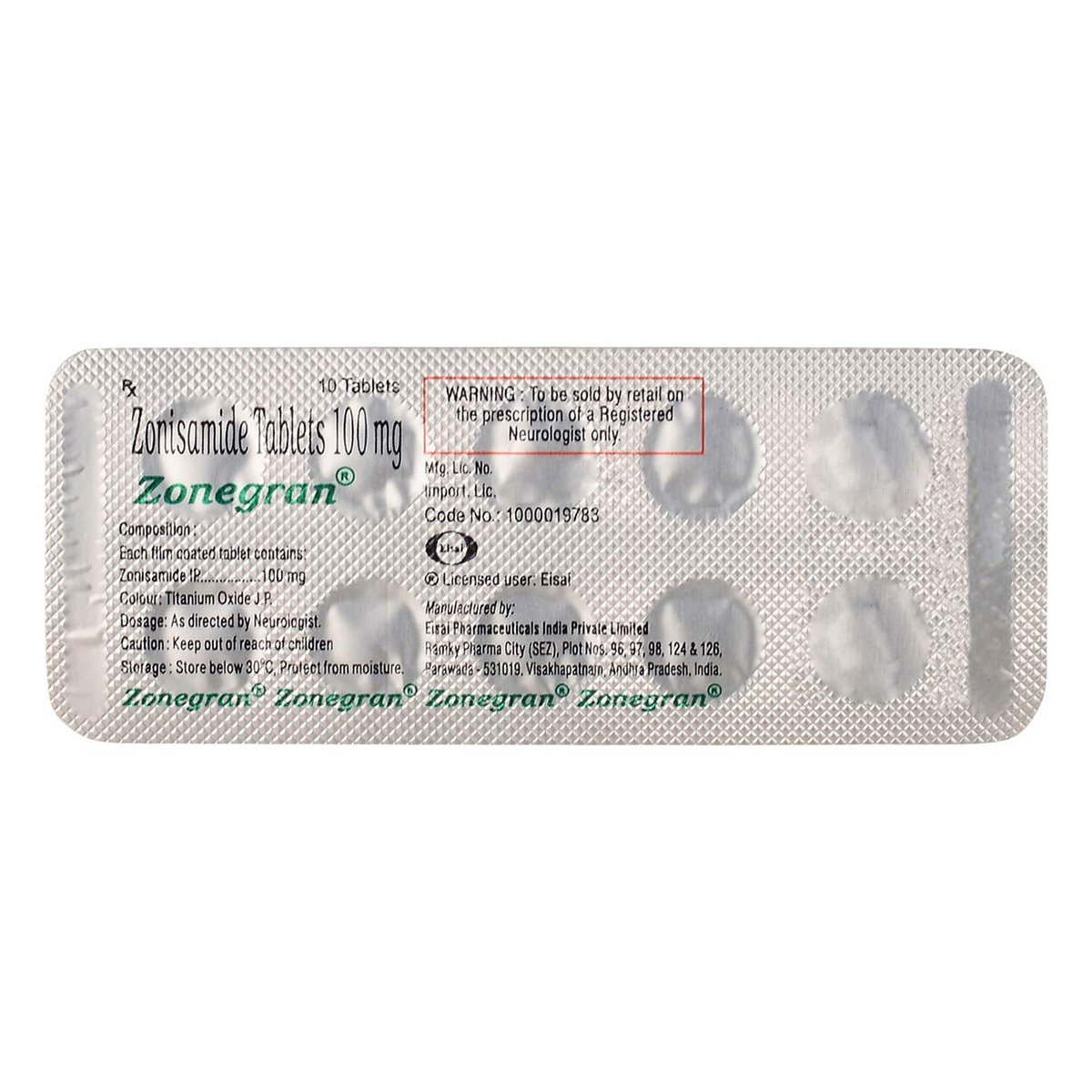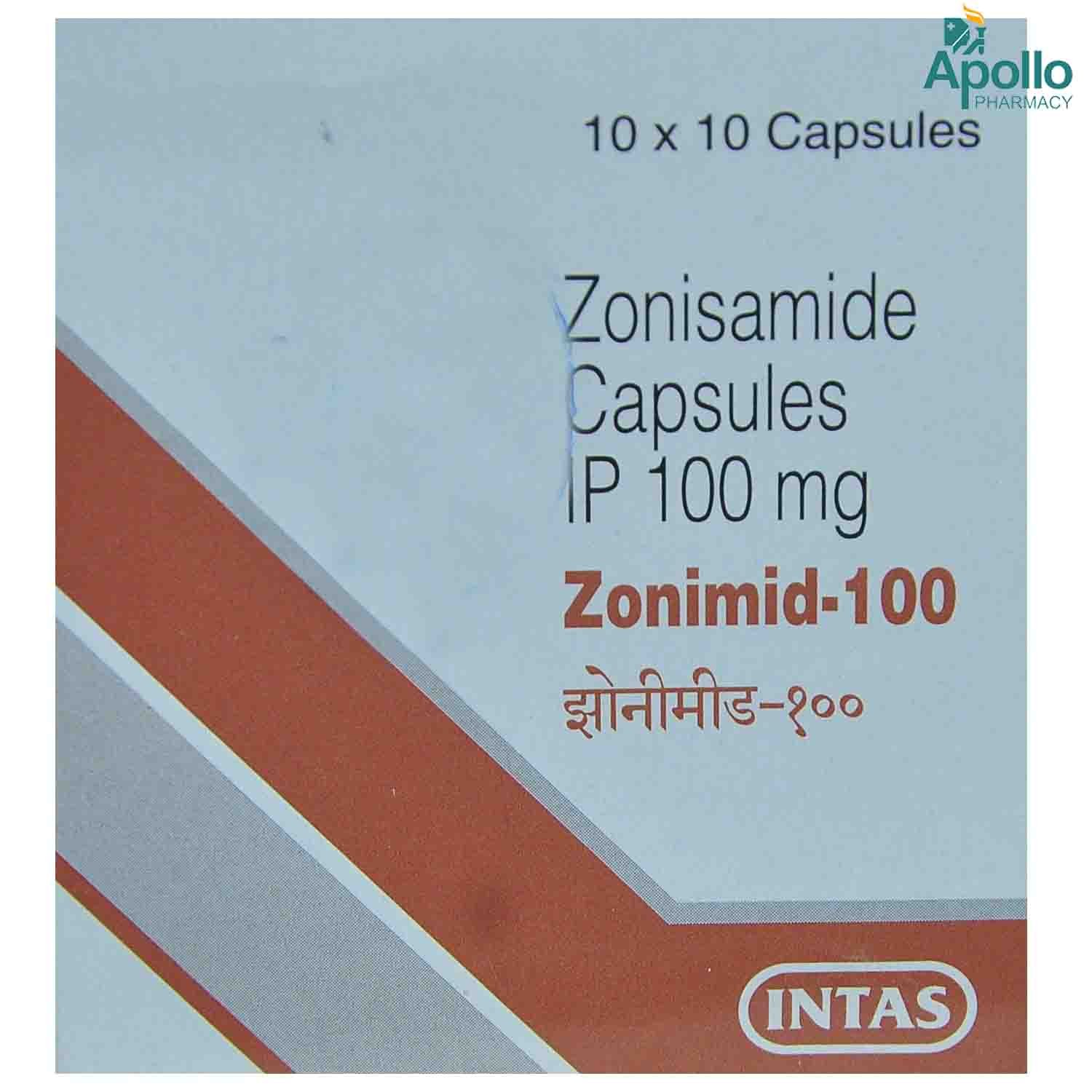Zonegran Tablet
MRP ₹245.5
(Inclusive of all Taxes)
₹36.8 Cashback (15%)
know your delivery time
Provide Delivery Location
Composition :
Manufacturer/Marketer :
Consume Type :
Expires on or after :
Return Policy :

Secure Payment

Trusted by 8 Crore Indians

Genuine Products
Therapeutic Class
Country of origin
Manufacturer/Marketer address
Author Details
We provide you with authentic, trustworthy and relevant information
FAQs
Disclaimer
Alcohol
Safe if prescribed
Avoid consumption of alcohol while taking Zonegran Tablet as it may increase dizziness and sleepiness.
Pregnancy
Consult your doctor
Avoid taking Zonegran Tablet if you are pregnant unless prescribed by a doctor to lead to serious birth defects/congenital disabilities. Please consult your doctor if you have any concerns regarding this, your doctor will prescribe only if the benefits outweigh the risks.
Breast Feeding
Consult your doctor
Zonegran Tablet should not be taken by breastfeeding mothers as it passes into breast milk and could lead to side-effects for breastfed babies.
Driving
Safe if prescribed
Zonegran Tablet causes drowsiness, sleepiness, and tiredness. Do not drive or operate machinery unless you are alert.
Liver
Consult your doctor
Dose adjustment may be needed in patients with liver impairment. Please consult your doctor if you have a liver impairment or any concerns regarding this.
Kidney
Consult your doctor
Dose adjustment may be needed in patients with kidney impairment. Please consult your doctor if you have kidney impairment or any concerns regarding this, your doctor will prescribe only if the benefits outweigh the risks.
Children
Safe if prescribed
Zonegran Tablet can be given to children above 6 years if prescribed by the doctor. The dose will be adjusted by the doctor depending upon the child's body weight.
About Zonegran Tablet
Zonegran Tablet belongs to a group of medicines called anti-convulsants or anti-epileptics used to treat epilepsy (seizures/fits). Epilepsy is a sudden rush of electricity in the brain. In epilepsy the brain's electrical rhythms become imbalanced, resulting in recurrent seizures. In patients with seizures, the typical brain electrical pattern is disrupted by sudden bursts of electrical impulses that affect an individual’s consciousness, movements, or sensations.
Zonegran Tablet contains 'Zonisamide’ that reduces the abnormal and excessive activity of nerve impulses in the brain that cause fits or seizures. Thereby helps in controlling seizures. In patients with seizures, the typical brain electrical pattern is disrupted by sudden bursts of electrical impulses that affect an individual’s consciousness, movements, or sensations. Zonegran Tablet is used alone or in combination to treat and prevent partial seizures in adults and children above 6 years of age.
Take Zonegran Tablet as prescribed by your doctor. You are advised to take Zonegran Tablet for as long as your doctor has prescribed it for you depending on your medical condition. In some cases, you may experience certain common side-effects such as dizziness, irritability, loss of appetite, memory impairment, double vision, confusion, depression, constipation, nausea, headache, uncontrolled movements. Most of these side-effects do not require medical attention and will resolve gradually over time. However, you are advised to talk to your doctor if you experience these side effects persistently.
To treat your condition effectually, continue taking Zonegran Tablet for as long as your doctor has prescribed. Please do not stop taking Zonegran Tablet without consulting your doctor to avoid worsening of seizures. Do not take Zonegran Tablet if you are pregnant or planning for pregnancy unless prescribed by the doctor. Avoid taking Zonegran Tablet while breastfeeding as it may cause side-effects in the breastfed babies. Zonegran Tablet should not be given to children unless prescribed. Zonegran Tablet causes drowsiness and dizziness, so drive if you are alert. Zonegran Tablet should not be given to children unless prescribed. Avoid consuming alcohol along with Zonegran Tablet as it could lead to increased dizziness and sleepiness. Consult your doctor immediately if you experience mood swings or suicidal tendencies. Zonegran Tablet can cause permanent vision loss, inform your doctor immediately if you have any eye pain, redness, or any changes in your vision. Keep your doctor informed about your health condition and medicines to rule out any side effects.
Uses of Zonegran Tablet
Medicinal Benefits Mweb
Key Benefits
Zonegran Tablet belongs to a group of medicines called anti-convulsants or anti-epileptics. Zonegran Tablet is used to treat epilepsy/seizures/fits. Epilepsy is a sudden rush of electricity in the brain. Zonegran Tablet works by blocking the sodium and calcium current in the brain and suppress the abnormal and excessive activity of nerve impulses in the brain that cause fits and pain. Thereby help in controlling seizures. Zonegran Tablet is used alone or in combination to treat and prevent partial seizures and generalized seizures in adults. Zonegran Tablet may be used as solo therapy or in combination in treating and preventing seizures in children above 6 years of age. Zonegran Tablet is not associated with any psychological or physical dependence, and there is no potential for abuse.
Directions for Use
Side Effects of Zonegran Tablet
- Dizziness
- drowsiness
- Irritability
- Loss of appetite
- Memory impairment
- Impaired coordination
- Double vision
- Confusion
- Kidney stones
- Diarrhoea
- Constipation
- Decreased blood levels of bicarbonates (a substance that prevents the blood from becoming acidic)
Drug Warnings
Do not take Zonegran Tablet if you are allergic to Zonisamide or any of its contents. Avoid intake of Zonegran Tablet if you are pregnant or planning for pregnancy unless prescribed by the doctor. Breastfeeding mothers should consult the doctor before using Zonegran Tablet to pass into the breast milk and affect the baby. Zonegran Tablet should not be given to children unless prescribed. Inform your doctor before taking Zonegran Tablet if you have or had kidney and liver problems, glaucoma, high levels of ammonia, osteoporosis, depression, heart problems if you have low levels of bicarbonate in blood you have previously suffered from kidney stones. Do not stop taking Zonegran Tablet without consulting your doctor to avoid worsening of seizure episodes. Zonegran Tablet causes drowsiness and dizziness, so drive only if you are alert. Avoid consuming alcohol along with Zonegran Tablet as it could lead to increased dizziness and sleepiness. Consult your doctor immediately if you experience mood swings or suicidal tendencies. Zonegran Tablet can cause permanent vision loss, inform your doctor immediately if you have any eye pain, redness, or any changes in your vision.
Drug-Drug Interactions
Drug-Drug Interactions
Login/Sign Up
Coadministration of Clemastine with Zonegran Tablet can increase the risk or severity of Zonegran Tablet side effects like increased body temperature and decreased sweating especially in warm weather.
How to manage the interaction:
Taking Clemastine with Zonegran Tablet together is not recommended as it can result in an interaction, it can be taken if your doctor has advised it. However, if you experience changes in blood pressure, increased heart rate, fever, or excessive sweating, contact a doctor immediately. Make sure to hydrate yourself during warm weather or after exercise. Do not discontinue any medications without consulting a doctor.
Coadministration of Risperidone with Zonegran Tablet can increase the risk of Zonegran Tablet side effects.
How to manage the interaction:
Taking Risperidone with Zonegran Tablet together is not recommended as it can result in an interaction, it can be taken if your doctor has advised it. However, if you experience changes in blood pressure, increased heart rate, fever, or excessive sweating, contact a doctor immediately. Do not discontinue any medications without consulting a doctor.
The combined use of Metformin with Zonegran Tablet may increase the risk of Lactic acidosis (excessive lactic acid production in the blood).
How to manage the interaction:
Co-administration Metformin with Zonegran Tablet can lead to an interaction, it can be taken if prescribed by a doctor. However, if you experience any symptoms such as weakness, muscle pain, respiratory distress, consult a doctor immediately. Do not stop using any medication without a doctor's advice.
Coadministration of Quetiapine with Zonegran Tablet can increase the risk or severity of Zonegran Tablet side effects like increased body temperature and decreased sweating especially in warm weather.
How to manage the interaction:
Taking Quetiapine with Zonegran Tablet together is not recommended as it can result in an interaction, it can be taken if your doctor has advised it. However, if you experience changes in blood pressure, increased heart rate, fever, or excessive sweating, contact a doctor immediately. Make sure to hydrate yourself during warm weather or after exercise. Do not discontinue any medications without consulting a doctor.
Coadministration of Olanzapine with Zonegran Tablet can increase the risk or severity of Zonegran Tablet side effects like increased body temperature and decreased sweating especially in warm weather.
How to manage the interaction:
Taking Olanzapine with Zonegran Tablet together is not recommended as it can result in an interaction, it can be taken if your doctor has advised it. However, if you experience changes in blood pressure, increased heart rate, fever, or excessive sweating, contact a doctor immediately. Make sure to hydrate yourself during warm weather or after exercise. Do not discontinue any medications without consulting a doctor.
Zonegran Tablet can cause Benzatropine to be eliminated from the body faster, leading to lower levels in the blood and possibly reducing its effectiveness.
How to manage the interaction:
Taking Benzatropine with Zonegran Tablet together can result in an interaction, but it can be taken if your doctor has advised it. If you're having any of these symptoms like feeling too hot, not sweating enough, feeling very tired, dizzy, or lightheaded, it's important to call a doctor right away. They may be able to recommend other options for you that won't cause these problems. Do not discontinue any medications without consulting a doctor.
Coadministration of Amoxapine with Zonegran Tablet can increase the risk or severity of Zonegran Tablet side effects like increased body temperature and decreased sweating especially in warm weather.
How to manage the interaction:
Taking Amoxapine with Zonegran Tablet together is not recommended as it can result in an interaction, it can be taken if your doctor has advised it. However, if you experience changes in blood pressure, increased heart rate, fever, or excessive sweating, contact a doctor immediately. Make sure to hydrate yourself during warm weather or after exercise. Do not discontinue any medications without consulting a doctor.
Using ketamine together with Zonegran Tablet may increase side effects.
How to manage the interaction:
Co-administration of Ketamine with Zonegran Tablet can result in an interaction, but it can be taken if your doctor has advised it. It's important to keep an eye on how you're breathing. If you notice any of these signs - dizziness, drowsiness, confusion, difficulty concentrating, excessive sedation, and respiratory depression - make sure to call a doctor right away. Do not discontinue any medications without consulting a doctor.
When lurasidone and Zonegran Tablet are taken together, they can induce a rise in body temperature and a decrease in sweating. Children are especially susceptible.
How to manage the interaction:
Even though lurasidone and Zonegran Tablet interact, they can be used if prescribed by a doctor. Heat stroke and hospitalization are possible in some persons, particularly in hot weather and during intense physical activity. Consult a doctor if you suffer any symptoms such as sleepiness, dizziness, or lightheadedness. Do not discontinue any medications without consulting a doctor.
Coadministration of Cariprazine with Zonegran Tablet can increase the risk or severity of Zonegran Tablet side effects like increased body temperature and decreased sweating.
How to manage the interaction:
Taking Cariprazine with Zonegran Tablet together can result in an interaction, but it can be taken if your doctor has advised it. However, if you experience changes in blood pressure, increased heart rate, fever, or excessive sweating, contact a doctor immediately. Make sure to hydrate yourself during warm weather or after exercise. Do not discontinue any medications without consulting a doctor.
Drug-Food Interactions
Drug-Food Interactions
Login/Sign Up
Drug-Diseases Interactions
Drug-Diseases Interactions
Login/Sign Up
Drug-Drug Interactions Checker List
- AMITRIPTYLINE
- DULOXETINE
- SERTRALINE
- FLUOXETINE
- GABAPENTIN
- LAMOTRIGINE
- PREGABALIN
- PHENYTOIN
- TOPIRAMATE
- ARIPIPRAZOLE
- QUETIAPINE
- LITHIUM
- ALPRAZOLAM
- ERYTHROMYCIN
- CLARITHROMYCIN
- TELITHROMYCIN
- CHLORPHENIRAMINE
- CODEINE
- OXYCODONE
- TRAMADOL
- MORPHINE
- DIPHENHYDRAMINE
- KETOCONAZOLE
- ITRACONAZOLE
- FLUCONAZOLE
- TRIAZOLAM
- TROLEANDOMYCIN
- BROMPHENIRAMINE
Habit Forming
Special Advise
- Regular monitoring of bicarbonate levels while taking Zonegran Tablet is advised to prevent low blood bicarbonate levels.
- Zonegran Tablet may cause low blood cell count, so if you have any red or purple spots on the body, let your doctor know about this.
Diet & Lifestyle Advise
- A ketogenic diet (low in carbohydrates and high in fats) is recommended for children with epilepsy. This diet helps in utilizing fat instead of glucose for the generation of energy.
- Atkins diet (high fay and controlled carbohydrates) is recommended for adolescents and adults.
- Rest well, get plenty of sleep.
- Avoid smoking and alcohol consumption.
- Exercise, meditation, and yoga can help lower stress, decrease pain sensitivity, and improves coping skills.
- Prepare your living area; small changes may reduce the risk of physical injury during a seizure.
- Install an alarm or emergency device to get assistance during a seizure attack.
All Substitutes & Brand Comparisons
RX
ZONIMID 100MG TABLET
Intas Pharmaceuticals Ltd
₹194
(₹17.46 per unit)
20% CHEAPERRX
Out of StockZonegram 100 mg Tablet 10's
Eisai Pharmaceuticals India Pvt Ltd
₹262
(₹23.58 per unit)
6% COSTLIER

Have a query?
















